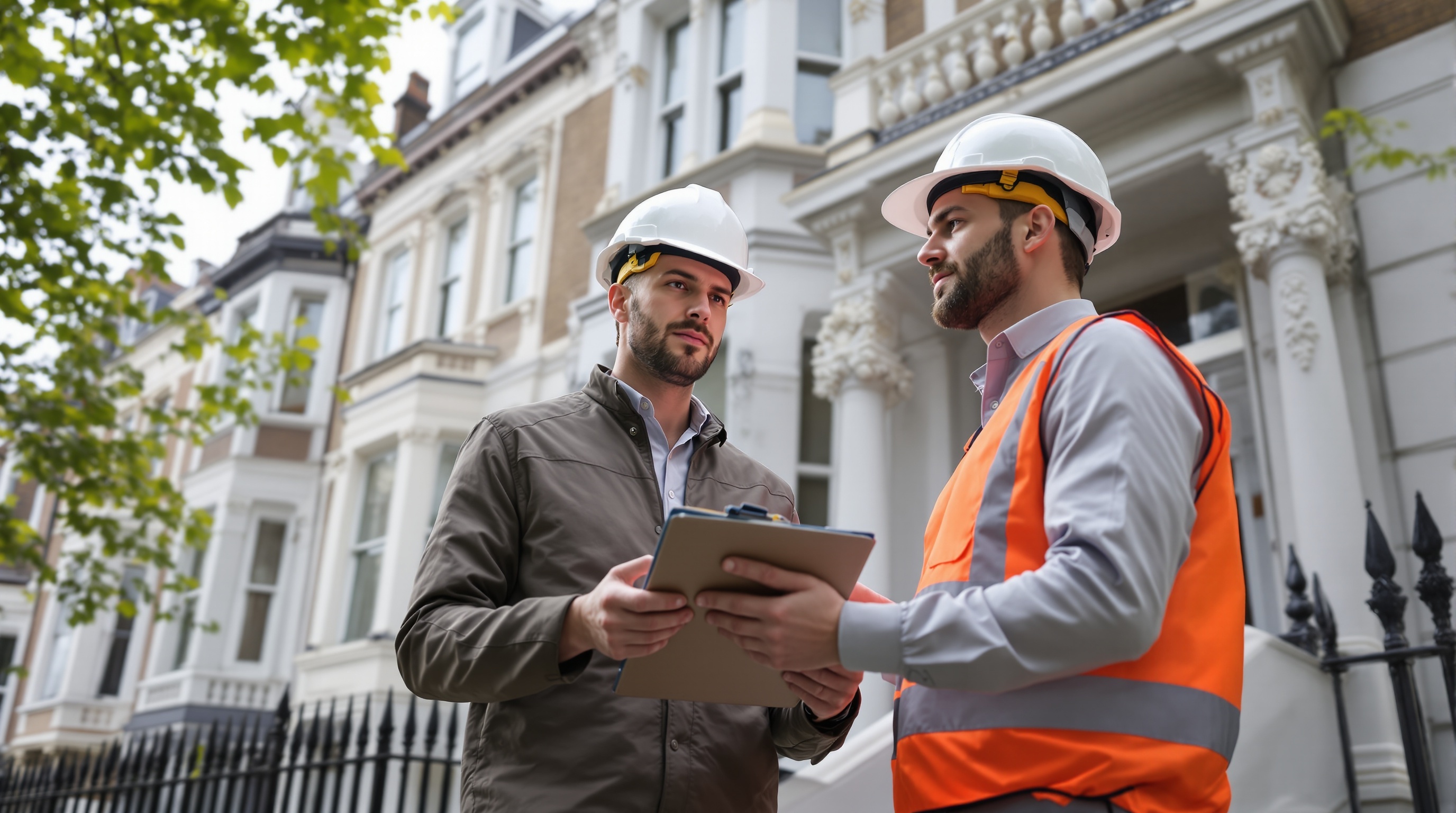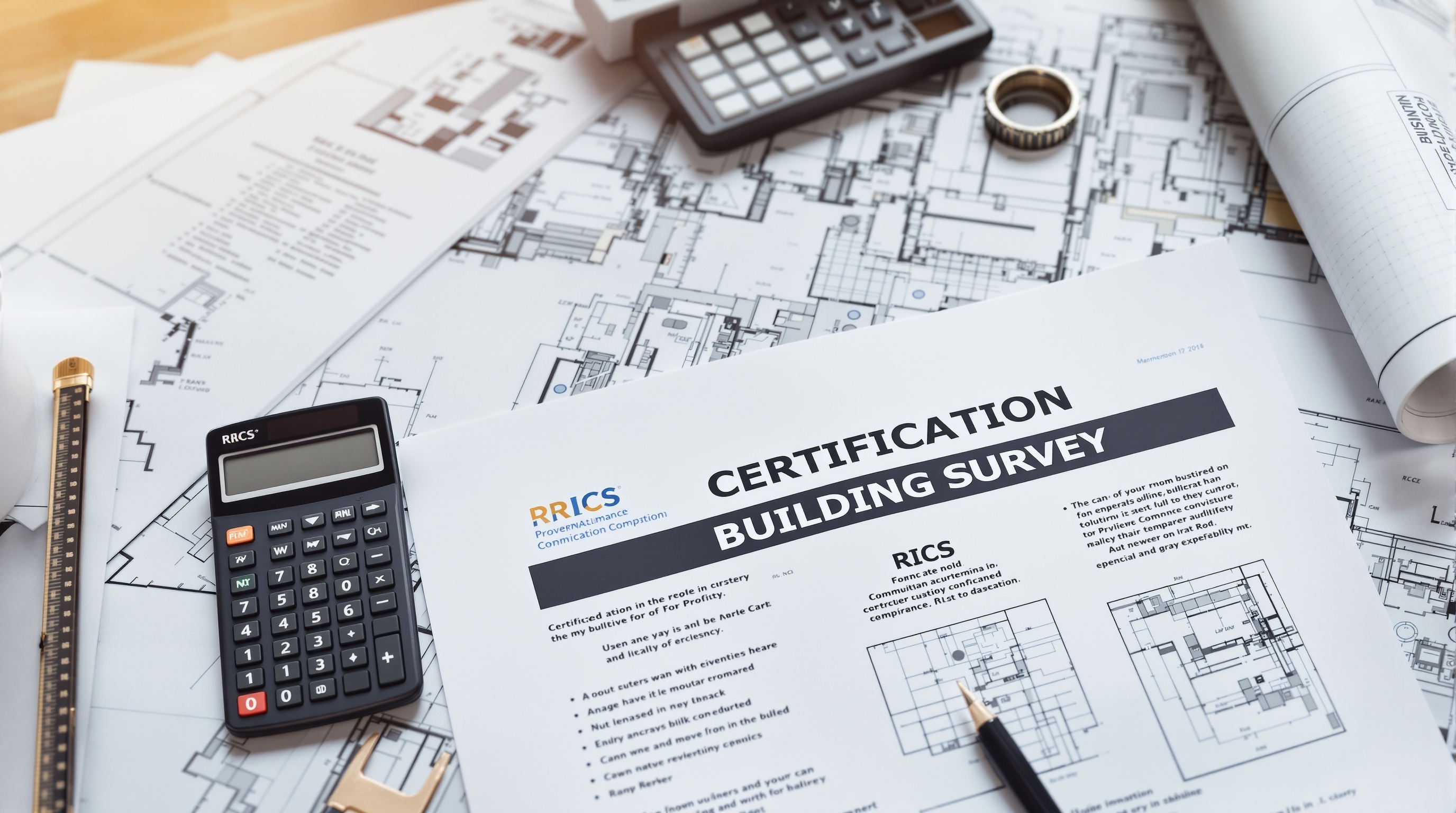
When you're buying a property in West End London or anywhere across the UK, one of the most important decisions you'll make is choosing the right survey. As RICS chartered building surveyors, we at West End Surveyors are often asked: "Should I get a homebuyer survey or a building survey?" The answer depends on several factors including the property's age, condition, and your future plans.
In this comprehensive guide, we'll explain the differences between RICS Level 2 Homebuyer Surveys and RICS Level 3 Building Surveys, helping you make an informed decision that could save you thousands of pounds in unexpected repairs.
Understanding RICS Survey Levels
The Royal Institution of Chartered Surveyors (RICS) standardizes property surveys in the UK through three levels. While Level 1 (Condition Report) is the most basic, most property buyers choose between Level 2 and Level 3 surveys. Let's break down what each involves.
What is a RICS Level 2 Homebuyer Survey?
The RICS Level 2 survey, commonly known as a Homebuyer Survey or Homebuyer Report, is designed for conventional properties in reasonable condition. This survey provides a middle-ground option between a basic valuation and a comprehensive building survey.
What Does a Level 2 Survey Cover?
A Level 2 Homebuyer Survey includes:
- Visual inspection of accessible areas without moving furniture or lifting floorboards
- Assessment of the property's condition using a traffic light system (green, amber, red)
- Identification of urgent defects requiring immediate attention
- Description of matters needing further investigation
- General maintenance recommendations
- Optional market valuation for mortgage purposes
The traffic light rating system makes it easy for buyers to understand priorities. Green indicates no major issues, amber highlights areas requiring further investigation or monitoring, and red signals serious defects demanding immediate action.

When is a Level 2 Survey Appropriate?
A Homebuyer Survey suits properties that are:
- Less than 100 years old
- Built using conventional construction methods
- In reasonable condition with no obvious major defects
- Not significantly altered or extended
If you're buying a modern apartment in Marylebone or a well-maintained Edwardian semi in Clapham, a Level 2 survey typically provides sufficient information for decision-making.
What is a RICS Level 3 Building Survey?
The RICS Level 3 Building Survey (formerly known as a Full Structural Survey) is the most comprehensive survey available. It provides detailed analysis of a property's construction, condition, and defects, making it ideal for older or more complex buildings.
What Does a Level 3 Building Survey Cover?
A Level 3 survey includes everything in a Level 2 survey, plus:
- More detailed inspection of accessible areas
- Description of construction methods and materials
- In-depth analysis of defects with causes and remedial advice
- Assessment of alterations and extensions
- Detailed report on roofs, walls, floors, and services
- Advice on repair priorities and estimated costs
- Recommendations for specialist investigations where needed
Unlike the Level 2 survey's traffic light system, the Level 3 report provides detailed written descriptions. Our chartered building surveyors at West End Surveyors typically produce reports of 40-80 pages for period properties in West End London, ensuring every aspect is thoroughly documented.
When is a Level 3 Building Survey Essential?
You should definitely consider a Level 3 survey if the property:
- Was built before 1900 (Victorian, Georgian, or earlier)
- Is in poor or dilapidated condition
- Has been significantly altered or extended
- Uses unusual construction methods
- Is a listed building or within a conservation area
- You're planning major renovations or alterations
For example, if you're purchasing a Georgian townhouse in Belgravia or a Victorian terrace in Kensington requiring refurbishment, a Level 3 survey is not just recommended—it's essential protection for your investment.
Key Differences Between Level 2 and Level 3 Surveys
Let's compare these surveys across important factors:
Depth of Inspection
Level 2 Homebuyer Survey: Visual inspection from ground level and accessible areas. Surveyors don't lift floorboards, move furniture, or access areas requiring specialist equipment.
Level 3 Building Survey: More thorough investigation including roof spaces (where safely accessible), under-floor areas, and detailed examination of structural elements. While still non-invasive, the surveyor takes more time to inspect comprehensively.
Report Detail
Level 2: Standardized format with traffic light ratings and brief descriptions. Typically 15-25 pages for a residential property.
Level 3: Bespoke detailed report describing construction, condition, and recommendations. Often 40-80+ pages depending on property complexity.
Cost Difference
In West End London, a Level 2 Homebuyer Survey typically costs £400-£800 for a standard residential property, while a Level 3 Building Survey ranges from £800-£1,500+ depending on property size and complexity. While the Level 3 survey costs more upfront, it can save tens of thousands in unexpected repairs.
I remember one client who opted for a cheaper Level 2 survey on a Victorian property in Notting Hill. After purchase, they discovered serious structural issues that would have been identified in a Level 3 survey, costing £45,000 to remediate. The £600 saving on the survey became a very expensive decision.
Purpose and Audience
Level 2: Designed for standard property purchases where the buyer needs a clear overview of condition.
Level 3: Suited for buyers planning renovations, property professionals, or anyone purchasing a non-standard property.
Making Your Decision: Which Survey Do You Need?
Consider these questions when deciding:
1. How old is the property?
Properties over 100 years old generally warrant a Level 3 survey due to age-related defects and construction methods unfamiliar to modern builders.
2. What's the property's condition?
If you've noticed cracks, dampness, or structural concerns during viewings, invest in a Level 3 survey for detailed analysis.
3. What are your plans?
Planning significant alterations? A Level 3 survey provides the detailed information architects and contractors need.
4. What's your budget?
While budget matters, remember that surveys are insurance against expensive surprises. A comprehensive survey can be a negotiating tool, potentially reducing the purchase price by more than the survey cost.
5. Is it a listed building?
Listed buildings and properties in conservation areas always require Level 3 surveys due to special considerations around alterations and repairs.
What About Valuations?
It's crucial to understand that neither survey level is the same as a mortgage valuation. Your lender will arrange a basic valuation to ensure the property is worth the loan amount, but this doesn't assess condition in detail.
Both Level 2 and Level 3 surveys can include a market valuation for an additional fee, providing independent verification of the property's value alongside the condition assessment.
The West End Surveyors Approach
At West End Surveyors, our RICS chartered building surveyors tailor every survey to the specific property. We understand that West End London properties—from Mayfair penthouses to Chelsea mews houses—have unique characteristics requiring specialist knowledge.
Our Level 3 surveys for period properties often incorporate drone surveys for roof inspections and thermal imaging for identifying hidden dampness or insulation defects. This combination of traditional expertise and modern technology ensures nothing is missed.
We also provide clear, jargon-free reports. After all, a survey is only valuable if you understand it. We're always available to discuss findings and answer questions—our service doesn't end when you receive the report.
Common Misconceptions
Myth 1: "A Level 2 survey is just as thorough as a Level 3"
While Level 2 surveys are valuable, they're not as comprehensive. The level of detail, inspection depth, and reporting style differ significantly.
Myth 2: "Building surveys are only for old properties"
Age is a factor, but condition matters more. Even newer properties can benefit from Level 3 surveys if they have defects or unusual construction.
Myth 3: "I don't need a survey if I'm paying cash"
Even without mortgage requirements, surveys protect your investment. Property defects don't discriminate based on how you're financing the purchase!
Myth 4: "Surveyors are just trying to find problems"
Professional surveyors provide impartial assessments. We report on both positive aspects and defects, giving you the complete picture.
Real-World Examples from West End London
Case Study 1: The Marylebone Apartment
A client was purchasing a 1960s apartment in Marylebone. We recommended a Level 2 survey as the property was conventional construction in good condition. The survey identified minor roof repairs and window maintenance issues, which we estimated at £8,000. The buyer negotiated a £10,000 price reduction, more than covering the survey cost and repairs.
Case Study 2: The Chelsea Townhouse
Another client was buying a Grade II listed Victorian townhouse in Chelsea. Our Level 3 building survey uncovered significant structural movement, outdated electrical systems, and concealed dampness behind modern plasterboard. Total remedial costs: £75,000. Armed with our detailed report, the buyer renegotiated the purchase price by £90,000.
These examples illustrate how the right survey level, conducted by experienced chartered surveyors, protects your investment and provides negotiating leverage.
Frequently Asked Questions
How long does each survey type take?
A Level 2 Homebuyer Survey typically takes 2-4 hours for a standard residential property, while a Level 3 Building Survey usually requires 4-8 hours depending on property size and complexity. Report delivery is typically within 5-7 working days for both survey types.
Can I upgrade from Level 2 to Level 3 after the inspection?
It's better to choose the appropriate level initially, as the surveyor conducts different types of inspections for each level. While you can commission a second survey, it's more cost-effective to select the right level first. If you're unsure, consult with your surveyor beforehand—we're happy to advise at West End Surveyors.
Do surveys include a valuation?
Both Level 2 and Level 3 surveys can include a market valuation for an additional fee, typically £100-200. This provides independent confirmation of the property's market value alongside the condition assessment.
Will the surveyor test electrical systems and boilers?
Surveyors conduct visual assessments of services but don't test them comprehensively. We typically recommend specialist electrical surveys, boiler services, or drainage investigations where concerns are identified during the survey.
What happens if the survey finds serious defects?
Serious defects give you options: renegotiate the purchase price, request the seller make repairs before completion, withdraw from the purchase, or proceed with full knowledge of required works. Your surveyor can advise on repair costs and priorities.
Are surveys required by law?
While not legally required, surveys are strongly recommended to protect your investment. Your mortgage lender will require a valuation, but this doesn't assess property condition comprehensively like a proper survey does.
Can I use the survey report to negotiate?
Absolutely. Survey reports provide objective evidence of defects and repair costs, giving you solid grounds for price renegotiation. Many of our clients successfully reduce purchase prices based on our findings.
How much does remedial work typically cost?
Costs vary enormously depending on defects identified. Minor repairs might be £5,000-10,000, while major structural work can exceed £50,000-100,000. Your survey report should provide estimated repair costs for significant issues.
Making the Right Choice for Your Property Purchase
Choosing between a Level 2 Homebuyer Survey and a Level 3 Building Survey comes down to understanding your property's characteristics, your risk tolerance, and your plans. When in doubt, err on the side of a more comprehensive survey—the detailed knowledge provides peace of mind and protects your investment.
At West End Surveyors, we've conducted thousands of surveys across West End London and beyond. Our RICS chartered building surveyors provide expert advice tailored to each property and client. Whether you need a straightforward Level 2 survey for a modern apartment or a detailed Level 3 assessment for a period property, we deliver professional service backed by decades of experience.
Remember, a property survey isn't an expense—it's an investment in knowledge. The few hundred pounds spent on the right survey can save tens of thousands in unexpected repairs and provide the confidence you need to make one of life's biggest financial decisions.
Considering a property purchase in West End London? Contact West End Surveyors for expert advice on which survey level suits your needs. Our experienced chartered building surveyors are here to help protect your investment.